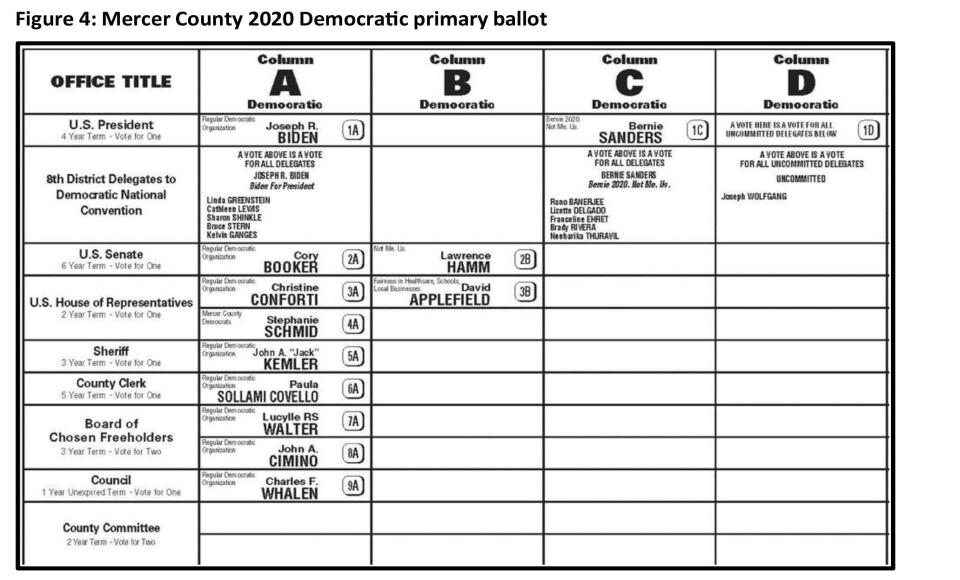NJ's ballot line system is dead — the 'magnitude' will reverberate across politics | Stile
- Oops!Something went wrong.Please try again later.
- Oops!Something went wrong.Please try again later.
At the very end of his historic 49-page ruling, U.S. District Judge Zahid Quraishi acknowledged he was setting off a political bomb that would reverberate in New Jersey politics long after the June 4 primary.
“The court wishes to make clear that it recognizes the magnitude of its decision," he wrote. “The integrity of the democratic process for a primary election is at stake and the remedy plaintiffs are seeking is extraordinary.”
Rarely is a judge more blunt than this. This was not simply a policy nerd fight over the way primary ballots are designed. This was no academic exercise.
Democracy was on the line — a concern that shapes not only this case over the cornerstone of New Jersey elections, but the outcome of the 2024 battle for the presidency. It is the anxiety of the national moment.
And, seen through that lens, the temporary injunction issued Friday aimed to alleviate that fear with a slam-dunk rejection of New Jersey’s Tammany Hall ballot system — the county line, as it's commonly called — which political bosses use to turn local and state legislators into rubber-stamp stooges for the party machine.

For nearly a century, the line allowed county chieftains to reward loyalists, punish dissenters and scare away pesky newcomers. It also allows them to virtually hand-pick future candidates for governor and Congress.
The importance of the line, and its role in propping up closed-door county parties, was crystallized in the image of U.S. Senate candidate Patricia Campos-Medina being blocked by five goonish operatives at the front doors from the Camden County Democratic Committee convention earlier this month as it formally awarded the ballot line to first lady Tammy Murphy for the U.S. Senate primary.
I was denied entry to Camden County Dems Convention. As a Latina woman candidate, I demand fairness. Time to abolish the county line for equal ballot access. Proud to stand for real representation. #Patricia4Senate #AbolishTheLineNJ @andykimnj @tammymurphynj @NJDSC pic.twitter.com/LnfQYdnsJM
— Patricia Campos Medina (@Patricia4NJ) March 16, 2024
'Things are moving forward'
Friday was a bad day for goon power.
Although lawyers for 17 county clerks who opposed the suit formally filed an appeal Friday, as expected, the ruling means — for now, at least — that the old-school bracketing of endorsed candidates in one row or column, usually in the first position on the primary ballot, has been thrown out for New Jersey's June 4 primary. Quraishi clarified Saturday that his temporary injunction applies only to the Democratic primary.
Still, even if the case gets bogged down in a lengthy appeals process, the ruling has changed Garden State politics forever. The momentum for change was already set in motion before Friday's ruling.
"At some point they need to recognize that things are moving forward," said Rep. Andy Kim, D-Burlington, who filed the lawsuit in February and is now the front-runner for the Democratic nomination for the U.S. Senate. "New Jersey politics is changing, and there is nothing they can do to hold it back."
The line has been the most important and coveted procedural prize in New Jersey politics — candidates bracketed on the line almost always won, by an average of 38 points, one study found. Unlucky candidates, newcomers, party dissenters or gadflies often were doomed to “Ballot Siberia," what Quraishi described as “obscure parts of the ballot that appear less important and are harder to locate.”

It’s where bosses send campaigns from unwanted competitors to die.
Friday’s ruling gives off-the-line candidates a fighting chance. Now the candidates for the same office will be grouped together in a so-called block fashion, a method used in the 49 other states. While the ruling still allows endorsed candidates to run under the slogan of the county parties, competitors will share the same starting line.
A new foundation
The block ballot is the new foundation for democracy in New Jersey.
Julia Sass Rubin, the Rutgers University professor whose studies of the pernicious effect of the ballot line system persuaded Quraishi to strike it down, says it may take several years for the new system to be embraced by party officials and voters. And she expects the party leaders to push back and find other ways to maintain their power.
But make no mistake: The ruling is a sea change for New Jersey politics, removing an administrative lever that propped up the Garden State’s sclerotic political machines.
Where were you when you found out The Line was struck down? I was with @alexfromNJ at a climate policy hack-a-thon for Rutgers and Princeton students. Suffice to say, the news found us well.
Much more to come on this massive development, but what a great day for democracy & NJ! https://t.co/nOcuswA8Zw pic.twitter.com/kSbrO2FfDd— Brandon J. McKoy (@Brandon_McKoy) March 29, 2024
“It undermines the entire system of machine power," Sass Rubin said. “It’s a different world. I just think you've taken away such a huge chunk of what they have to keep in power and really the only thing that makes us different.”
She also said elected officials and candidates will now feel free to assert themselves, be “more brave” without fear of retaliation that county chairs will deny them the line for reelection. The ruling also opens the door for wider grassroots involvement in the granular, committee-level seats in county parties now that party-picked candidates will no longer have the advantage of running on the county line.
“I think that the grassroots energy becomes a much more important currency, which is how democracy is supposed to work," Sass Rubin said.
Added Jeff Tittel, a former executive director of the New Jersey Sierra Club and former political strategist: “This is a political earthquake that can change the New Jersey political landscape forever.”
The ruling liberates candidates from having to kiss the rings of party bosses in next year’s crowded races for governor. Essex County, for example, will have two local candidates competing for support, Newark Mayor Ras Baraka and Rep. Mikie Sherrill, D-Montclair. Now they will be grouped in one block on the ballot instead of competing in an intra-party Game of Thrones to win the ballot line in Essex.
It also breathes new energy into off-the-line candidates who, despite strong fundraising and local support, were facing an uphill fight against machine-endorsed candidates.
“Now New Jersey will get what 49 other states have: free and fair elections. It’s a great day for democracy," said Hoboken Mayor Ravi Bhalla2, who is challenging incumbent Rep. Rob Menendez Jr. in the 8th Congressional District primary.
Charlie Stile: The Murphys want to protect their progressive NJ legacy — fueled by the line
Charlie Stile: How far will the fallout from the end of Tammy Murphy's Senate campaign reach?
Menendez indictment sets a firestorm in motion
Ironically, it was the federal corruption indictment of Menendez’s father, Sen. Bob Menendez, that set in motion the forces that led to Friday’s decision. Shortly after his indictment in late September, Kim, a former Obama administration official with little presence outside his congressional district near Philadelphia, announced that he would seek Menendez’s seat this year. Menendez, whose trial is set to begin May 6, has announced he won’t seek reelection as a Democrat, though he has left open the possibility of running as an independent if exonerated.
But in November, Murphy leaped into the race, and within weeks she had consolidated the endorsements of populous north Jersey counties, representing more than 50% of the Democratic voter base. It made her the hands-down front-runner despite never having held elective office and her past as a Republican donor and voter.
Yet it didn’t scare away Kim, who recognized a grassroots backlash over Murphy’s candidacy. And in February, Kim filed his lawsuit, claiming that the county line balloting was unconstitutional and anti-democratic. The fight over the line quickly became the central issue in the campaign, even as Kim continued to win endorsements in most counties where committee people could privately cast their votes without pressure from the party bosses.
The lawsuit opened up the floodgates for reform. Sensing the "sea change," a wide range of officials, including candidates for governor in 2025, called to abolish or reform the system. The four top legislative leaders announced they planned to study the issue — a stance they repeated Friday in the wake of Quraishi's ruling. But in a stunning move, Attorney General Matthew Platkin — who had been close to the Murphys — announced that he deemed the line unconstitutional.
Trailing in the polls and struggling with fundraising — and facing the prospect that even the power of the line might not have carried her to victory — Murphy dropped out of the race on March 24.
In the days that followed, both the governor and Murphy broadly defended the line, saying it had allowed the governor to catapult into office and produce a progressive agenda. But both Murphys said they would be open to reforming the system, without endorsing any proposal. The governor’s office made no comment as of late Friday.
The fallout over the decision will be felt for the next 10 weeks as county officials scramble to draft new vote-by-mail ballots and in-person voting ballots for the June 4 primary. But for now, the decision is a reminder that in New Jersey, most legislators cannot be counted on to make landmark reforms that affect their ability to wield power.
Over the years, the legislators passed feeble pay-to-play restrictions on campaign fundraising that are poorly enforced or eroded. In 2007, they enacted a half-measure ban on dual office holding that allowed a crop of current lawmakers to keep local and legislative posts.
In recent weeks, lawmakers tried to ram through a proposed gutting of the Open Public Records Act, which allows the public and the press to keep close tabs on the inner workings of government.
In that context, the “magnitude" of Quraishi’s decision, is, indeed, “extraordinary.”
Charlie Stile is a veteran New Jersey political columnist. For unlimited access to his unique insights into New Jersey’s political power structure and his powerful watchdog work, please subscribe or activate your digital account today.
Email: stile@northjersey.com
This article originally appeared on NorthJersey.com: NJ county line ballot decision will upend Garden State politics

